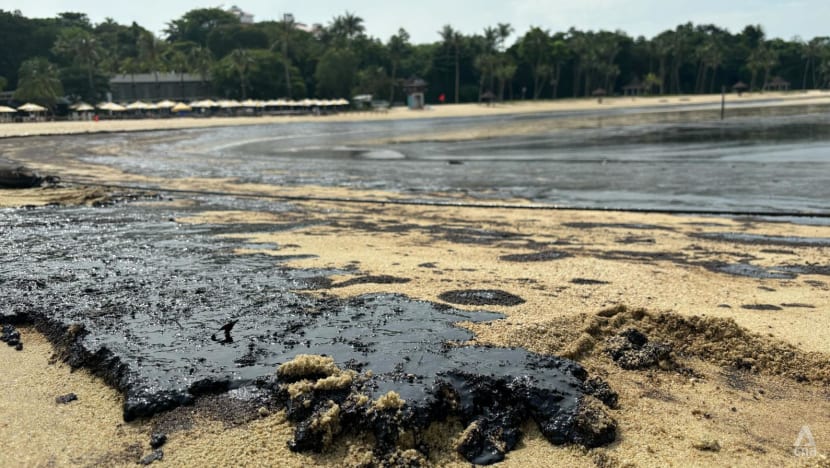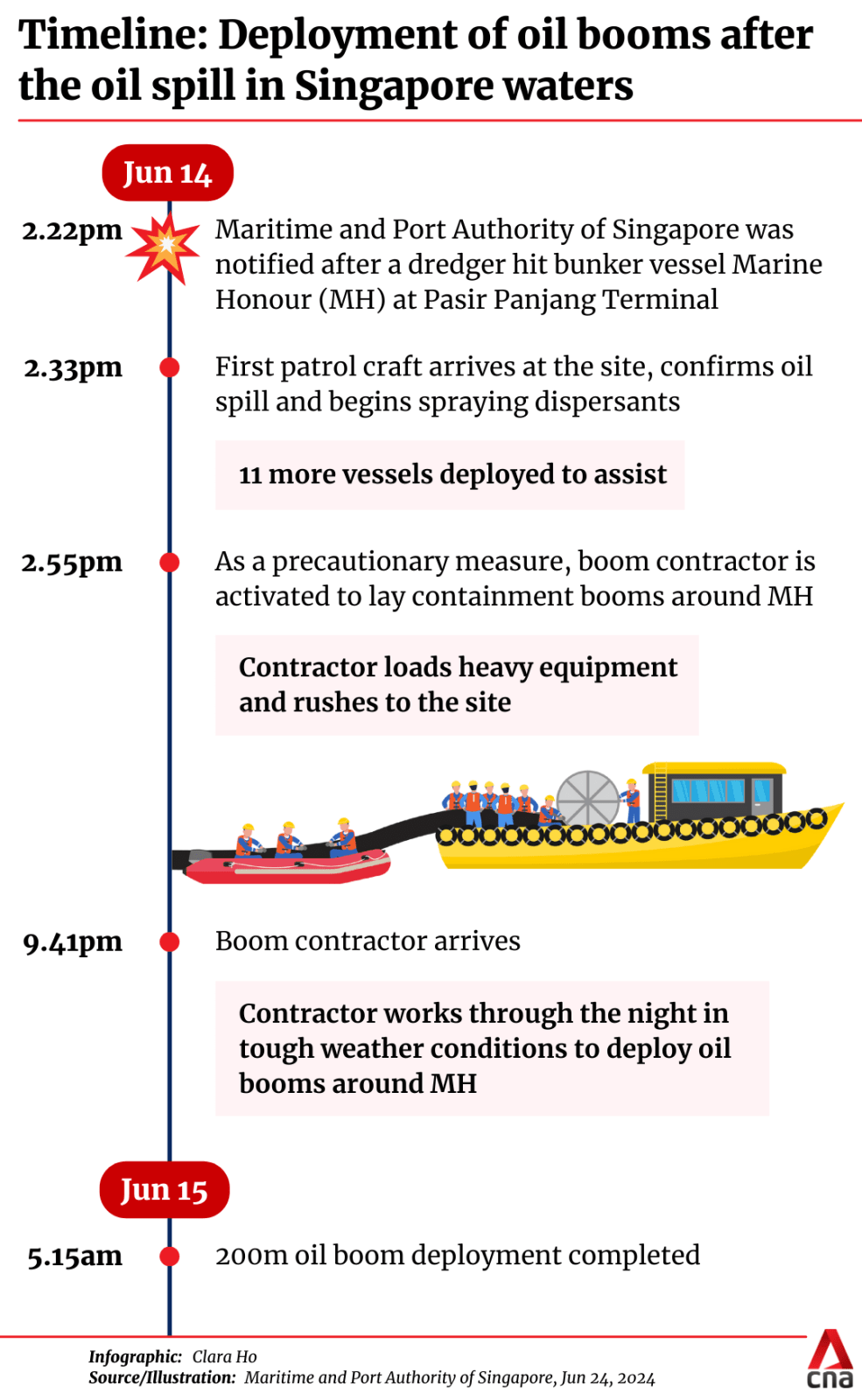Businesses affected by Singapore oil spill may get help with rent
Minister for Sustainability and the Environment Grace Fu acknowledged the frustration and inconvenience that affected businesses have experienced.

Sentosa's Tanjong Beach is seen on the morning of Jun 16, 2024, two days after an oil spill at Pasir Panjang Terminal. (Photo: CNA/Davina Tham)

This audio is generated by an AI tool.
SINGAPORE: Government agencies are developing rental deferral measures to help businesses struggling with the impact of the recent oil spill, Minister for Sustainability and the Environment Grace Fu said on Tuesday (Jul 2).
It has been more than two weeks since the oil spill stained several beaches along Singapore's southern coastline, including those at Sentosa, East Coast Park, St John's Island and Lazarus Island.
And clean-up operations would take around three months before the affected beaches are progressively reopened to the public.
In her ministerial statement in parliament on Tuesday, Ms Fu acknowledged the frustration and inconvenience that affected businesses have experienced. Some had called for government assistance, telling CNA last week that they are already struggling to stay afloat.
"That is why Sentosa Development Corporation (SDC), which manages Sentosa and businesses on the Southern Islands, and other agencies such as NParks that collectively manage the beachfront along East Coast Park, have been proactively reaching out to their tenants," she told the House.
"The agencies are developing rental deferral measures to help affected businesses with their cash flow, on a case-by-case basis. SDC will also look to promote a return of footfall through marketing and social media support."
Ms Fu reiterated that the economic losses resulting from the oil spill can be assessed for claims, while contact details of the insurer have been made available to the public.
Oil spilt into the sea on Jun 14 after a Netherlands-flagged dredger hit a Singapore-flagged bunker vessel at Pasir Panjang Terminal.
As of Tuesday, the washing of berths at Pasir Panjang Container Terminal is about 20 per cent done, with the estimated completion date by the end of July, according to an update issued by several agencies on Tuesday.
Port operations are not affected during this clean-up effort, the statement added.
Members of Parliament had filed 40 questions on the issue, such as the impact on the environment, whether cleaners had sufficient protection and whether there were learning points from the oil spill response.
Noting that businesses face other cost pressures beyond rents, Progress Singapore Party's Non-Constituency MP Hazel Poa asked if the government is looking into other forms of support, such as helping smaller businesses seek compensation or providing financial aid like bridging loans on preferential terms.
In response, Ms Fu, who is also Minister-in-charge of Trade Relations, said businesses have been impacted differently. Those running sea-based activities remain closed. Among businesses operating on the beaches, some have “very much resumed to pre-spill days” while others have not.
“We cannot take a … standard approach or one-standard solution for the businesses and government agencies will be very prepared to listen to the plight of the businesses and see how we can best help them,” Ms Fu said.
Land-based agencies such as NParks and SDC have reached out to affected tenants. Other impacted businesses that do not have a “very strong land-based business on the affected beaches” can contact the SDC or the Singapore Tourism Board, the minister added.

PROTECTION OF WORKERS
Describing the well-being of workers as a “priority”, Ms Fu noted that “many steps” have been taken to ensure the safety of those involved in the clean-up operations.
These include monitoring air quality through the National Environment Agency's (NEA) network of air monitoring stations located at various locations in Singapore, such as Sentosa and the eastern end of East Coast Park.
The monitoring stations, which keep tabs on ambient levels of volatile organic compounds (VOCs), "did not detect any anomalies over this period of time", including for benzene, toluene and xylene (BTX) that are commonly associated with bunkering fuels and other petrochemicals, said the minister.
The agency also started conducting daily air quality tests using mobile detectors at affected areas of East Coast Park, Sentosa and Labrador Nature Reserve on Jun 15 when oil slicks reached parts of Singapore’s coastlines.
“The VOCs detected, including for BTX, have been well within safe limits,” Ms Fu said.
In the immediate few days after the oil spill, NEA issued a general advisory for those involved in the clean-up effort to include masks, goggles, rubber gloves and high waterproof boots as part of their personal protective equipment.
"This was done as an additional precaution even though the air quality was well within safe levels," said Ms Fu.
This advisory was later updated after the bulk of the oil was removed to note that masks and goggles are no longer required, she added.
Service providers involved in the oil spill response are familiar with their roles and processes, having participated in regular oil spill exercises, the minister said.
These providers include specialised contractors involved in laying booms and mopping up difficult-to-clean areas such as rock bunds, as well as general cleaning contractors in charge of clearing the beaches of oily sand and debris.
Ms Fu noted that those involved are briefed on their tasks and workplace safety before being deployed. Agencies and their contractors are also “regularly reminded to ensure that sufficient rest breaks and rehydration are provided”.
“We have also reminded cleaning contractors to ensure that workers receive rest days and consider rotating workers where possible. Workers who feel unwell should approach their employer for support and assistance,” she said.
The authorities are also considering mobilising volunteers for the final phase of the clean-up efforts. This is where beaches will be combed to remove "tar balls" – remnant oil deposits that have hardened and mixed with sand.
“This process is labour-intensive and if we have more hands to help, we can relieve the cleaners and accelerate the reopening of the beaches,” said Ms Fu.
“If and when volunteers are mobilised, we will tap on those who have registered with NParks, as well as many volunteer groups who have contacted me personally and MSE through social media and WhatsApp, after assessing that it is safe to do so.”
The Public Hygiene Council will also help to train, equip and coordinate with volunteers for this effort, she added.
LONG-TERM IMPACT ON ENVIRONMENT
Minister for National Development Desmond Lee and Transport Minister Chee Hong Tat also delivered ministerial statements on the oil spill.
Addressing the impact on the environment, Mr Lee said that the oil spill situation remains dynamic, and there could be a time lag between the oil spill and its effects on Singapore's biodiversity and habitats.
Mr Lee added that there has been no significant impact observed so far on Singapore’s marine biodiversity and wildlife.
“Some of the impacts on our marine and coastal ecosystems may only show up weeks, or even months later, such as during spawning periods,” said Mr Lee. “Assessments of the environmental impact of the oil spill on our offshore islands are therefore also still ongoing.”
Based on previous experiences with oil spills, such as one in 2010 that affected the intertidal and seagrass habitats at Tanah Merah, as well as a 2017 oil spill that affected Chek Jawa Wetlands at Pulau Ubin and Changi Beach Park, Singapore’s eco-systems are resilient and will take time to recover.
For both cases, there are no signs of impact or discernible changes today, said Mr Lee.
He added that the government will closely monitor the impact on and recovery of marine habitats and biodiversity, including seagrasses, corals and aquatic wildlife, through intertidal and subtidal biodiversity surveys.
The National Parks Board will also undertake rescue and rehabilitative efforts for affected wildlife where necessary.
OIL SPILL SOPS WILL BE CONTINUALLY UPDATED
Learning from the latest oil spill incident, government agencies will continue to update and improve their standard operating procedures (SOPs), Mr Chee said.
Agencies will continue to prepare their teams to deal with oil spills effectively through training and regular inter-agency exercises, he added.
“While we do our best to reduce the risks, oil spills may still happen in our waters or in the region,” Mr Chee noted.
“It is not possible to completely eliminate this risk.
“Therefore, we have prepared for and maintained our readiness to respond in a prompt, coordinated and effective manner when such incidents occur.”
Mr Chee added that the government has worked with industry partners to develop a contingency plan, which is rehearsed and refined every two years during inter-agency exercises for oil spills.
“Our SOPs were enhanced along the way, and they helped us respond to this incident effectively,” he said.
“We will continue to update and improve our SOPs and contingency plans with learning points from this incident, and prepare our teams to deal with oil spills effectively through training and regular inter-agency exercises.”
In addition, steps have also been taken over the years to enhance the safety of vessels and bunkering operations, to minimise the risk of accidents and oil spills.
“We have also put in place practices such as mandatory safety training and shipboard drills for vessel crew on incident response, as well as inspections for vessels in our port to ensure compliance with international safety conventions,” the Transport Minister said.
In response to a supplementary question by MP Liang Eng Hwa (PAP-Bukit Panjang) on whether there would be higher shipping costs in the wake of the oil spill incident, Mr Chee said this is not likely.
“I do not think this incident will lead to an increase in shipping costs because it is affecting two vessels in this case, and not something that is structural or systemic,” he explained.
“MPA very quickly ensured that port and shipping operations were not affected on Jun 14 soon after the allision occurred, so that ships can still come into our anchorages, call at our ports, cargo could still be loaded and unloaded … port operations continued.”
This is unlike what is happening at the Red Sea, where there is a shipping crisis due to the potential of attacks by Yemen-based Houthis.
“That kind of incident … that will affect global shipping costs because ships have to then detour and go a longer distance,” he said.
Mr Chee added that Singapore’s reputation as a maritime hub was also not impacted.
“Precisely because our response to the oil spill was swift and effective, I think it didn’t damage our reputation as an international hub port and maritime centre, he said.”






















